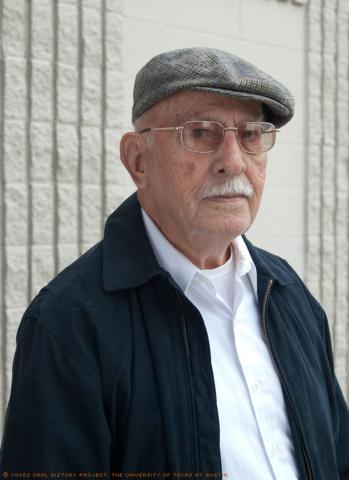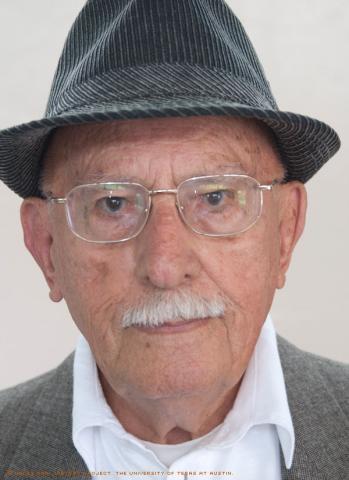

By Sonia Alvarez and Joe Muller
Due to his father's career as a casting agent and magazine entertainment writer, Severo Lopez always held a special place in his heart for the arts and cinematography.
After watching Frank Sinatra perform at the Palladium in Los Angeles in the early 1940s, Lopez arrived home after midnight and was shocked to see an FBI car waiting at his front door. He was informed that he had failed to report for duty when his World War II draft notice arrived.
Lopez pleaded with the agents, explaining that he was working for the shipyards in nearby San Pedro, as part of the war effort when his letter ordering him into the military arrived at his Los Angeles home. The agents understood his plight and had him report to the regional drafting center the next morning, he said.
The next day, his group of draftees were told they had two weeks to finish up their personal lives before attending a three-month basic training. But Lopez was not given that extra time.
"You're going to go to Arlington, California," Lopez recalled having been told. "You'll be in the Army at 11 a.m."
Lopez would serve in the military for nearly two years, witnessing the aftermath of battle and learning new skills. He would also hold fast to family – and gain an even greater appreciation for his father. "I didn't see [my parents] for two months," Lopez said of the training period in Arlington. "When I first got there, we weren't allowed any visitors."
At the time of his induction, Lopez lamented not even getting a chance to say goodbye to his family.
"I felt kidnapped!" Lopez said with a laugh. Lopez not only left behind an anguished family but a fiancée, Hilda, whom he had met a year earlier in Los Angeles.
Two months later, while still in training, Lopez was granted five days of leave so that he could attend the funeral of his fiancée's mother in Los Angeles. It was then that Lopez married Hilda, whose maiden name was also Lopez.
It was a very emotional moment for Lopez: He had recently been drafted, was now a newlywed, and his mother-in-law had just passed away.
After Arlington, he was sent for additional training to Washington state. Before his military service, Lopez had worked on the war effort helping to build equipment. Because of that experience, Lopez was trained as a combat engineer and assigned to the 155th Engineer Combat Battalion.
After nine months of training, in which he learned to make cable out of ropes, wires and metal bolts, he shipped out to Hawaii.
Lopez said his experiences during his military service in the Pacific made him realize why his father intentionally added an extra "r" to the word – Warr. That, he said, more accurately conveyed the physical and emotional toll of the conflict he lived through.
Initially, Lopez was responsible for making the cables that would pull malfunctioning tanks and ships.
He saw his first combat at Guadalcanal during the first major Allied offensive in the South Pacific, which was fought from November 1942 to February 1943. He remembered that the Japanese had a system of booby traps set up to fend off the Allied troops. Lopez describes this as a network of weaponry. Lopez said that, during his time there, 8,000 American soldiers tried for two weeks to take the island. He recalled how even the ocean's waves were marked by the battle.
"You know lots of men had died when the waves started to look red," he said. "That was such an unbelievable feeling to see that amount of blood on the shoreline…"
It was hard for Lopez to accept what he was seeing.
"…Me, living a simple life, I thought that was the most horrible experience I would ever go through."
This sight helped shape Lopez's values for the rest of his life.
The initial loneliness was not something to which the El Paso, Texas, native was accustomed. He responded by writing to his family, particularly his father.
"My Dad wrote the most interesting letters," Lopez said. "He knew the language really well."
Lopez said that he was fascinated with the way his father wove words together to create such an impact on him. With every letter he read, Lopez said, he missed his father more.
He chalked up his father's writing ability to the experience he had in his profession as a magazine entertainment writer.
His earlier life occupied Lopez's mind as he headed to war. On one ship, he befriended two New York barbers through a mutual love for motion pictures. Lopez said he shared his stories about the California entertainment industry in exchange for tips on how to cut hair. He found that he liked cutting hair and eventually also learned to shave others.
"Everybody's hair was getting long," Lopez said. When he was ready to cut, he would blow a whistle and soldiers would line-up to get a trim.
He even caught the eye of his captains who, after haircuts of their own, asked him to cut all of the officers' hair and made him the company barber for the 155 Combat Engineers Battalion, with 3,000 soldiers.
Lopez was born on April 28, 1923, to Spaniard Primo Lopez Moran and his Mexican wife, Eva Raya Trejo.
During the Great Depression, his father's bookstore at El Paso, called La Pluma (The Pen) was forced to shut down. As a result, in 1927 the Lopez family moved to Los Angeles, where a family friend who worked for Paramount Studios helped them get jobs.
That enabled Lopez and his five siblings to work as extras and dancers in the Spanish-language movies. In the coming decade, the Lopez children would appear in movies such as "Carnival in Costa Rica," "A Kid from Spain," "Notice of Adventure" and "A Day in Havana."
Lopez continued to perform in movies until he was drafted. He recalled that a very famous 1940s actress and dancer, who used the stage name Rita Hayworth, had originally been named Margarita Cansino and was the daughter of Eduardo Cansino, a dancer from Spain. Lopez said that she nicknamed him El Encantador ("The Charmer").
Despite the horrors of war, Lopez said that he fully enjoys his life. He said he had to come to peace with himself and some things from his memory; he learned to accept sadness but also joy, relying on his motto: "Vive tu vida lo mejor que puedas, de día a día siempre" (Live your life the best you can, always day by day.)
"I tried very hard to forget it [the war]… One of the priests said 'Well, in your mind you are going to have to make an effort and get rid of it, so you don't carry it with you, because it can create a very emotional state of mind now and later.' "
His unit eventually retreated and headed to the Philippines after a rest and relaxation period in New Zealand. However, Lopez became very sick -- he went from 154 pounds to 90 in the course of a couple of weeks.
"I went to the hospital because I started throwing up," Lopez said. "Some kind of infection from ... a chemical substance that grows like a weed."
Lopez was transferred to a San Francisco hospital. When his sister, Carolyn, went to visit him, she did not recognize him.
Eventually, the doctors were able to nurse him back to health while eating four meals a day. On April 20, 1945, Pfc. Lopez was honorably discharged and was released from the Dibble General Hospital in Menlo Park, Calif., to return to his family.
After returning to civilian life, Lopez worked hard in a variety of fields — movies, construction, as a mechanic and as a salesman — to put his children, Paul S., George, and Irene, through college. He was also a businessman — having owned at different times a print shop, a restaurant and a gas station.
His wife, Hilda, passed away in 1979. He later married Angelica del Razo and gained two stepchildren, Apolo and Yadira.
Lopez, who was 87 at the time of his interview, was healthy and strong-willed and ready to deliver his message: "You can get through these things and still be a very normal human."
He continued to work in the California film industry and, at the time of the interview, still attended meetings of the American Legion and made donations to the Disabled American Veterans.
As for his father, Lopez is left with more than just the rewards that stem from his entertainment background. He also passed down words of wisdom to his three children that he heard from his father: "Live your life the best you can…"
Mr. Lopez was interviewed by Frank O. Sotomayor in Los Angeles on June 9, 2010.

